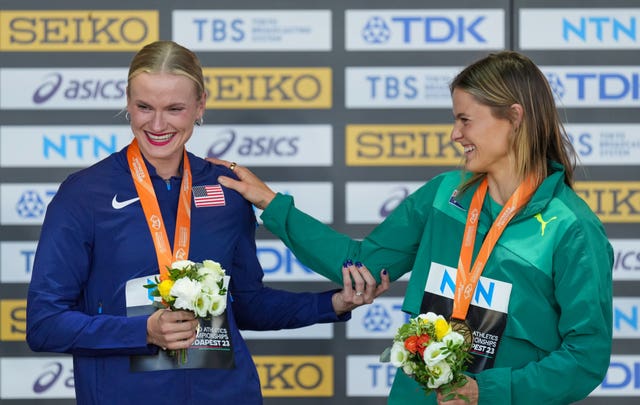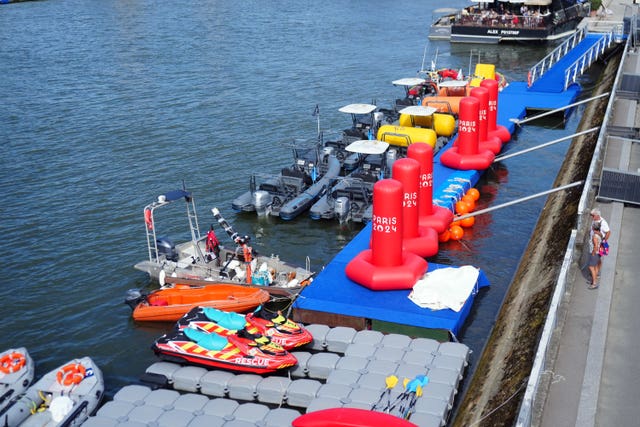Lord Coe defends awarding of prize money in athletics at Paris Olympics
The World Athletics president also admitted climate change could force some endurance events to be moved.

World Athletics president Lord Coe addressed controversy over Olympic prize money and reissued a dire warning over the “existential threat” of climate change in a wide-ranging press conference on the first day of athletics action in Paris.
In April, Lord Coe’s organisation became the first sport governing body to announce it would be awarding prize money to Olympic champions, with $50,000 United States dollars going to gold medallists in Paris, with the ambition of lesser amounts to be awarded to athletes who collect silver and bronze at Los Angeles 2028.
The 67-year-old Briton, who in August ran unopposed for a third term, did not flatly rule out whether or not he would consider eventually campaigning for the International Olympic Committee presidency but reiterated his commitment to the current cause.
Addressing the prize money, Lord Coe said: “I’m really surprised if people don’t see the correlation between athletes of high profile that are comfortable and whose welfare is being looked after, and their ability to perform and raise the profile of the sport and add to the broadcast revenues and the sponsorships that come in.
“It’s not complicated to recognise that the athletes need to be reflected in those proceeds of growth. I find nothing particularly strange about it and we’re not the only ones funding athletes. Well over 60 percent of national Olympic committees have done that for as long as I can remember.”
Criticism has come from federations with much smaller coffers, concerned that the surprise move might put pressure on other sports to do the same.
World Athletics CEO Jon Ridgeon added: “They’re the stars of the show, and if you look at our existing world championships beyond the Olympic Games, we were spending $24 million in prize money over four years of the cycle in our existing championships, and we just felt that our highest-profile event should be part of that.”
Ridgeon also confirmed that in a situation in which athletes decided to share a gold medal in Paris – such as that famously of Tokyo 2020 high jumpers and between pole vaulters Katie Moon and Nina Kennedy at last year’s world championships – the prize money would be split.

In Paris, 144 medals are up for grabs over 11 days of athletics action, beginning with Ecuadorian Brian Pintado’s victory in the men’s race walk on Thursday morning, when both the men’s and women’s individual competitions were delayed by weather.
Lord Coe has kept a keen eye on the forecast in Paris, where the equivalent of a typical July rainfall bore down in 36 hours, blighting the opening ceremony and contributing to the postponement of several events.
Men’s triathlon was perhaps the most high-profile victim, with organisers postponing its start by a day after unsafe levels of E. Coli in the Seine.
Last month, in a report published by the British Association for Sustainable Sport, Lord Coe wrote that “climate change should increasingly be viewed as an existential threat to sport”.
He expanded further in Paris, saying, “I think sport is going to have to take some of these issues in our own hands, I do. I can’t see us not having a root and branch review of the global calendar to deal with some of these issues.
“When it comes to athletics, it’s quite serious because we’re talking about the welfare of the athletes, and maybe we are going to have to move some of our endurance events to other times of the year.
“We don’t always want to have to turn up as an international federation with a field hospital. We just need to make sure that if we are true to our word about athletes being the first thought and not the last consideration, then there are lots of things we are going to have to address sooner rather than later.”

Lord Coe added he felt “governments of all persuasions aren’t doing this properly” and therefore it was up to “individual sectors” to mitigate.
The president also covered off shoe technology – he admitted there was “a balance” to be struck but felt it was wrong to “strangle innovation” and doubled down on the federation’s stance to ban Russian and Belarusian athletes from its competitions over the war in Ukraine.
He largely embraced Michael Johnson’s new Grand Slam Track competition, set to launch in April 2025 and offering US $12.6m (£9.8m) prize pot, calling fresh investment “a collaborator, not a rival”, but stopped short of declaring his bid to replace Thomas Bach as IOC president – the German is set to step down in 2025 under current rules which could be changed.
Lord Coe joked, 44 minutes into the briefing: “I’ve done quite well to get this far without (someone asking). There’s a lot more I want to achieve at World Athletics.
“This is my last term and will be my last term, (but) it’s difficult to look beyond that, because I don’t think anybody is very clear about whether there will even be a vacancy.”





